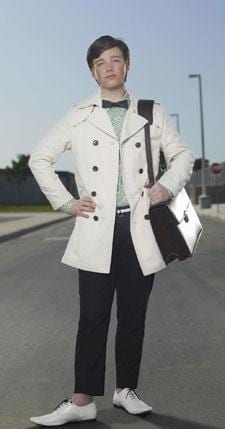We live in a world of reality and spectacle. In the spectacular celebrity world, it is becoming increasingly acceptable to come out of the closet. Many actors who play gay on TV actually end up being gay in reality. First there was Adamo Ruggiero from Degrassi, then Luc MacFarlane from Brothers and Sisters. Most recently Chris Colfer, who plays the young gay Kurt Hummel on TV’s campy hit show Glee created by Ryan Murphy, has come out of the closet. In his interview with the Advocate, Colfer remarked on the stark contrast of his life pre- and post-Glee: “It’s changed my life from night and day. From being a weird, small-town kid to now being on a successful TV show. It’s white and black, night and day. It’s completely changed my world.”
But which world was he referring to? Colfer was quick to point out that he would never have come out during high school. “Oh, no. People are killed in my hometown for that.”
Elsewhere in the real world a 16-year-old boy from Georgia made headlines when he was ousted from his school for dressing in a manner deemed too feminine. Jonathan Escobar, who recently transferred to North Cobb High in Kennesaw, Georgia, was harassed by fellow students for wearing items typically designated as women’s clothing to school. It was on the day he wore a pink wig that his peers just lost it. A school official informed the teenager that it was his choice to either stop dressing in such a feminine manner or consider home-schooling. The assistant principal blamed Escobar and his flamboyant attire and the school has asked Escobar to dress in a more “manly” fashion.
In East Cleveland, mayor Eric Brewer drew lots of media scrutiny when personal racy pictures of him dressed in women’s clothing surfaced at a strategically competitive election moment. Brewer lost the election to his competitor Gary Norton and has now had to weather what is largely understood to be a PR disaster. Brewer explained that he put on women’s lingerie at the suggestion of a girlfriend. An interviewer remarked, “No offense, but you weren’t the best-looking woman.” To which Brewer replied, “To the lady I was with, I looked great. We had a good time.”
This anecdotal evidence leaves me wondering if our society is more accepting of queerness only if it presents itself in the world of spectacle. Celebrities, who come out on a macrocosmic, spectacular level, and affirm their real or imagined gay personas, are somehow generally accepted. Yes, people still hate them from afar, but this doesn’t affect them in the same way as people like Escobar and Brewer. I can understand how it is helpful for young people to have queer role models, and to see celebrities coming out. Still, the protective aura of celebrity is significant. It remains to be seen exactly how these macrocosmic gestures of gay representation and visibility permeate into the mainstream. In the everyday world of reality, in the microcosm, people like Eric Brewer, Jonathan Escobar and the rest of us remain subjected to deep embedded homophobia and cruelty. It doesn’t seem to matter how many celebrities or gay characters there are in the spectacular world. At the microcosmic level we all have to deal with our own internalized garbage in the world of reality.
One of the latest viral video sensations making the rounds is of two cage fighters from Swansea in the UK who were out for a stag party one night and were dressed in drag for fun. When they were attacked, they responded swiftly and Daniel “Lights Out” Lerwell lived up to his namesake, taking the aggressors down. I hope this isn’t the solution, that anyone who wants to wear a dress or a pink wig or anyone, really, should consider training to be a cage fighter just in case some punk gives you trouble and you need to teach them a lesson.

 Why you can trust Xtra
Why you can trust Xtra


